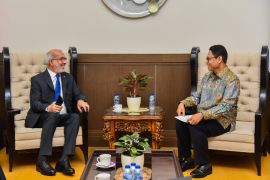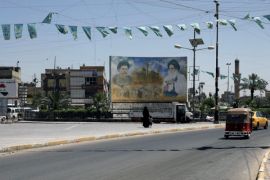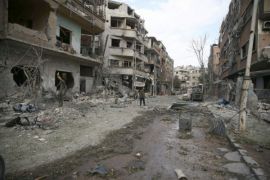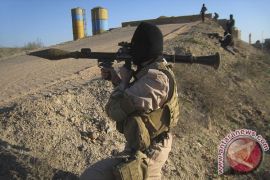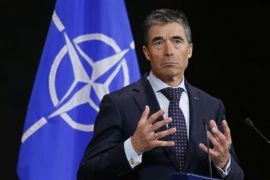The blast was the deadliest in a series of bombings Thursday that claimed 53 lives across the city, and is the latest in a spate of violence in the past 10 days that has killed more people than in November or December.
The surge in attacks, mostly targeting majority Shiite Muslims, comes little more than a month after Prime Minister Nuri al-Maliki formed a national unity government, ending nine months of deadlock following elections in March.
An interior ministry official said the car bomb, which exploded outside a tent where mourners were gathered for a funeral ceremony, killed 48 people and wounded 121.
The blast, which took place at around 1:30 pm (1030 GMT) in the Shuala neighbourhood, completely burned the tent and left pools of blood and scattered pieces of clothing and shoes, an AFP journalist said.
Several cars were also completely destroyed, while the windows of nearby homes were shattered. Security forces closed off many of the main roads leading to the blast site and imposed a vehicle curfew.
Policemen and soldiers who rushed to the scene were confronted by an angry mob that assaulted them with volleys of stones, the official said, adding that "armed men" had fired on security forces, beating them away from the blast site.
"They withdrew until a regiment from the army came and started to fire into the air to disperse the crowds," he said, adding that a vehicle curfew had been put into place.
Maliki ordered the arrest of the area`s security chief, army Lieutenant Colonel Ahmed al-Obeidi, in the immediate aftermath of the attack.
In other blasts around the capital, five people were killed and 21 wounded by roadside bomb attacks and a bomb placed inside a minibus.
The overall death toll of 53 was the highest for Baghdad since November 2, when 11 car bombs rocked the capital, killing 63 and wounding nearly 300 in predominantly Shiite neighbourhoods.
The funeral attack was the latest targeting Shiites since a spate of car bombings last week killed 57 people outside the shrine city of Karbala.
Those bombings came ahead of a Shiite mourning ritual when hundreds of thousands of pilgrims poured into the city to mark 40 days after the Ashura anniversary commemorating the slaying of Imam Hussein, the sect`s revered seventh century saint.
On January 20 on the outskirts of Karbala, three car bombs exploded among crowds of worshippers around 20 minutes apart, killing 45 people and wounding 150 others.
Another triple car bombing four days later killed 12 and wounded dozens.
Imam Hussein`s death at a battle near Karbala is at the heart of the historical division between Islam`s Sunni and Shiite sects.
The split has fuelled sectarian violence between Iraq`s Shiite majority and the Sunni Arab minority that dominated Saddam Hussein`s regime until its ouster in the US-led invasion of 2003.
Also last week, Al-Qaeda`s front group in Iraq claimed responsibility for a series of suicide bombings north of Baghdad that cost more than 60 lives.
The Islamic State of Iraq said its suicide bombers carried out attacks in Baquba and Tikrit, according to a US group that monitors jihadist statements.
The attacks in the two cities had targeted Iraqi security forces and the provincial council of Diyala, of which Baquba is the capital. The ISI accused it of attempting "to spread the Shiite doctrine" in the central province.
Violence across Iraq since a suicide bomber blew himself up in the middle of a crowd of police recruits in Tikrit on January 18 has already killed more people -- at least 192 -- than in November and December, when 171 and 151 people died, respectively. (*)
Editor: Kunto Wibisono
Copyright © ANTARA 2011
